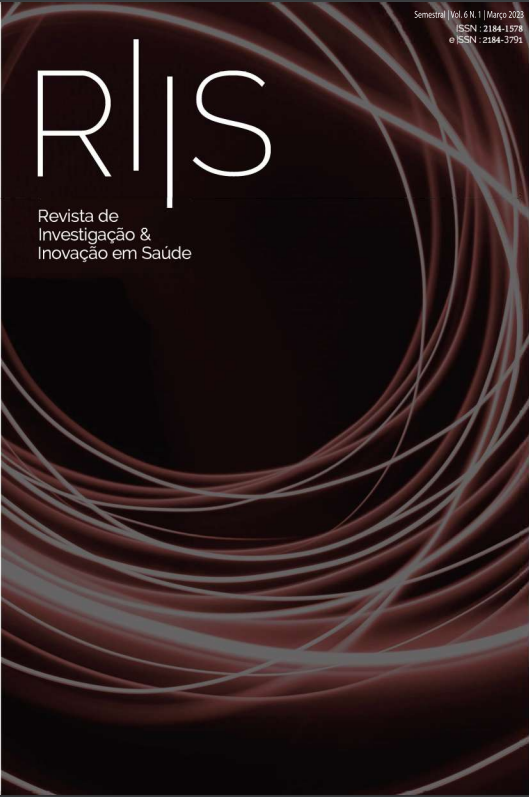Psychoscocial risks: prevention and control of occupational stress
DOI:
https://doi.org/10.37914/riis.v6i1.212Keywords:
psychosocial risks, occupational stress, prevention, controlAbstract
Background: psychosocial risks significantly affect workers mental health, which may lead to the emergence of stress as the main risk factor in the work environment. Considered the second most reported health problem in Europe, it is essential to invest in prevention and health promotion measures in the workplace to ensure high levels of health and mental well-being for workers. Objective: identify effective occupational health strategies for the prevention and control of stress in the workplace. Methodology: an integrative literature review was carried out based on MeSHTM descriptors through the EBSCOhost platform based on the underlying inclusion and exclusion criteria, with the analysis of 5 articles. Results: from the analysis of the articles, it appears that the interventions for the prevention and control of stress are integrated in the individual domains (including the subdomains: self-assessment (symptoms), self-knowledge, motivation, time management and lifestyles) and organizational (integrating the subdomains: planning; leadership; conflict management; structural empowerment; professional recognition and music therapy). Conclusions: stress-free work environments contribute to workers' health and well-being. Organizational support systems, audits on exposure to stress, counselling, education, training, and work balance initiatives needs to be created. The importance of investment in research and implementation of occupational stress management strategies is highlighted.
References
Brunório, W., Pasotti, J. R., Cardoso, C.A.A.S., & Felix, J. J.C. (2017). Liderança e Motivação no Trabalho. Racre - Revista de Administração, Brasília. 17 (21). http://ferramentas.unipinhal.edu.br/racre/viewarticle.php?id=308
Castañon, L. N., & Leite, M. I. M. G. (2020). Musicoterapia na qualidade de vida em ambiente laboral: conhecendo efeitos da musicoterapia. Cadernos de Psicologia. 1(2), 452-472. ISSN 26749483. https://seer.cesjf.br/index.php/cadernospsicologia/article/view/2503/1636
Castelôa, L., Luís, S., Romeiro, T., & Oliveira, I. (2019). Prevalência das lesões músculoesqueléticas relacionadas com o trabalho dos enfermeiros: revisão integrativa. Revista de Investigação & Inovação em Saúde, 2(1), 63-74. Prevalência das lesões músculo-esqueléticas relacionadas com o trabalho dos enfermeiros: Revisão integrativa | Revista de Investigação & Inovação em Saúde (essnortecvp.pt) DOI: https://doi.org/10.37914/riis.v2i1.48
Craig, J. & Smyth, R. (2004). Prática Baseada na Evidência Manual para Enfermeiros. Loures: Lusociência - Edições Técnicas e Científicas, Lda. ISBN:972-8383-61-4
Direção Geral da Saúde (2021). Vigilância da Saúde dos Trabalhadores Expostos a Fatores de Risco Psicossocial no Local de Trabalho- Guia Técnico nº3/ Programa Nacional de Saúde Ocupacional. Lisboa: Direção Geral da Saúde. https://www.dgs.pt/saude-ocupacional/referenciais-tecnicos-e-normativos/guias-tecnicos/guia-tecnico-n-3-pdf.aspx
EU-OSHA. (2021). Portal da Agência Europeia para a Segurança e Saúde no Trabalho. Riscos psicossociais e stresse no trabalho - Segurança e saúde no trabalho - EU-OSHA (europa.eu)
Freitas, L. (2011). Segurança e Saúde do Trabalho. Lisboa: Edições Sílabo.
Grube, G. & Trevelin, A. (2019) Gestão de conflitos nas organizações: o papel do líder na resolução de conflitos. Revista Interface Tecnológica. 16 (1), 291-301. https://revista.fatectq.edu.br/index.php/interfacetecnologica/article/view/522
Jacobs, C. M. (2019). Ineffective-Leader-Induced Occupational Stress. SAGE Open. April-June 2019, 1–15. https://doi.org/10.1177/2158244019855858 DOI: https://doi.org/10.1177/2158244019855858
Jukic, T., Ihan, A., Strojnik, V., Stubljar, D., & Starc, A. (2020). The effect of active occupational stress management on psychosocial and physiological wellbeing: a pilot study. BMC Medical Informatics and Decision Making, (20), 1-9. https://doi.org/10.1186/s12911-020-01347-z DOI: https://doi.org/10.1186/s12911-020-01347-z
Kacem, I., Kahloul, M., El Arem, S., Ayachi,S., Hafsia,M., Maoua, M., Ben Othmane,M., El Maalel, O., Hmida, W., Bouallague, O. Ben Abdessalem, K., Naija, W., & Mrizeka, N. (2020). Effects of music therapy on occupational stress and burn-out risk of operating room staff. Libyan Journal of Medicine, (15), 1-9. https://doi.org/10.1080/19932820.2020.1768024 DOI: https://doi.org/10.1080/19932820.2020.1768024
Michailidis, E.& Cropley, M. (2018). Investigating the predictors of workplace embitterment using a longitudinal design. Reino unido. Occupational Medicine, Volume 68 (8), 523–529. https://doi.org/10.1093/occmed/kqy121> DOI: https://doi.org/10.1093/occmed/kqy121
Orgambídez-Ramos, A., Borrego-Alés, Y., & Ruiz-Frutos, C. (2018). Empowerment, vulnerabilidad al estrés y burnout en enfermeros portugueses. Ciência & Saúde Coletiva, 23(1), 259-266. https://doi.org/10.1590/1413-81232018231.15522015> DOI: https://doi.org/10.1590/1413-81232018231.15522015
Queirós, C., Borges, E., Teixeira, A. & Maio, T. (2018). Estratégias de Prevenção do Stress, Burnout e Bullying no Trabalho. In Borges, E. (coord.) (Eds.), Enfermagem do Trabalho: Formação, Investigação e Estratégias de Intervenção (pp. 139-151). Lisboa: Lidel. ISBN:978-989-752-342-7.
RashidAzar, S. & Alimohammadzadeh, K. & Akhyani, N. (2018). Investigation of the relationship between structural empowerment and reduction of nurses’ occupational stress and job burnout (case study: Nurses of public hospitals in Tehran). Revista Latinoamericana de Hipertension. (13), 547-553.
Ravari, A., Farokhzadian, J., Nematollahi, M., Miri, S. & Foroughameri, G. (2020). The Effectiveness of a Time Management Workshop on Job Stress of Nurses Working in Emergency Departments: An Experimental Study. Journal of Emergency Nursing, 46(4), 548. https://doi.org/10.1016/j.jen.2020.03.013>. DOI: https://doi.org/10.1016/j.jen.2020.03.013
Santos de Carvalho, C. M., Gouveia, A. L., Barreira Pinto, C. A., Mendes Mónico, L. dos S., Fernandes Correia, M. M., & Dinis Parreira, P. M. S. (2017). Empowerment em profissionais de saúde: Uma revisão da literatura. Psychologica, 60(2), 45-63. < https://doi.org/10.14195/1647-8606_60-2_3> DOI: https://doi.org/10.14195/1647-8606_60-2_3
Teich, E. J. (2020). Music Therapy-Based Workplace Health Promotion Programming: Wellness Facilitated Through Community Music-Making Experientials. [Tese de Mestrado, Universidade do estado do Arizona, Arizona]. https://repository.asu.edu/attachments/227432/content/Teich_asu_0010N_20007.pdf>.
Ueno, L., Bobroff, M., Martins, J., Machado, R., Linares, P. & Gaspar, S. (2017). Occupational stress: stressors referred by the nursing team. Journal of Nursing UFPE on line, 11(4), 1632-1639.
Untarini, N., Sayyida, & Singh, S. K. (2020). Occupational stress management in managerial employees: an analysis of level and source of work stress. BISMA (Bisnis dan Manajemen), 13(1), 47-68. https://doi.org/10.26740/bisma.v13n1.p47-68. DOI: https://doi.org/10.26740/bisma.v13n1.p47-68
Zinat Mohebbi Z., Dehkordi S.F., Sharif S., Banitalebi E. (2019). The Effect of Aerobic Exercise on Occupational Stress of Female Nurses: A Controlled Clinical Trial. Invest. Educ. Enferm. 37(2). https://doi.org/10.17533/udea.iee.v37n2e05 DOI: https://doi.org/10.17533/udea.iee.v37n2e05
Downloads
Published
How to Cite
Issue
Section
License
Copyright (c) 2023 Paula Farias, Catarina Santos, Rita Pinho, Marta Pereira, Iara Teixeira, Manuela Ferreira

This work is licensed under a Creative Commons Attribution 4.0 International License.















